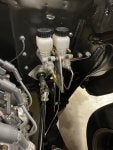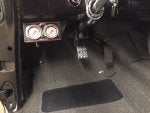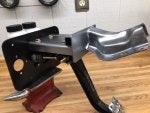Ok, I'm looking at getting the CPP MCPV-1 for my 57.
The car has the large GM front disc brake calipers, and I just converted the rear disc brakes so that they are using the 79 Eldorado rear disc brake calipers. (Had stock drums before)
The car has a dual 7" or 8" brake booster.
In the future I will probably go to dual piston front brake calipers (probably PBR C15's) BUT want to avoid doing that now as this build has already snowballed.
But with the current configuration, will the 1-1/8" bore size work properly?
The car has the large GM front disc brake calipers, and I just converted the rear disc brakes so that they are using the 79 Eldorado rear disc brake calipers. (Had stock drums before)
The car has a dual 7" or 8" brake booster.
In the future I will probably go to dual piston front brake calipers (probably PBR C15's) BUT want to avoid doing that now as this build has already snowballed.
But with the current configuration, will the 1-1/8" bore size work properly?








